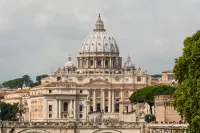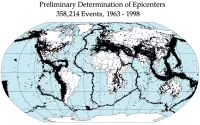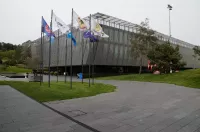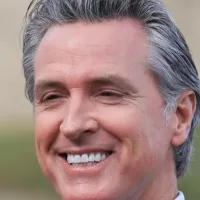Sicily, the largest and most populous Mediterranean island, is an autonomous region in Italy with a rich cultural heritage. Home to 4.8 million people, its capital is Palermo. Named after the ancient Sicels, the island boasts unique traditions in arts, music, literature, food, and architecture.
1906: Targa Florio Race is Founded
The Targa Florio, a prestigious sports car race, was established in 1906 by Sicilian industrialist Vincenzo Florio.
December 1908: Messina Earthquake Devastates Sicily
On December 28, 1908, a devastating earthquake struck Messina, Sicily, resulting in the deaths of over 80,000 people.
1934: Luigi Pirandello Wins Nobel Prize
Luigi Pirandello, a renowned Sicilian writer, was honored with the Nobel Prize in Literature in 1934.
1943: Sicilian Independence Movement and the Triskeles Symbol
During World War II, the triskeles symbol was adopted by the Sicilian independence movement led by Andrea Finocchiaro Aprile, advocating for Sicily's independence with Allied support.
1943: Sicilian Independence Movement
The Sicilian Independence Movement (MIS) emerges in 1943, advocating for Sicily's separation from Italy.
May 1946: Sicily Granted Special Status within Italy
In May 1946, 18 days before the Italian institutional referendum, Sicily was granted special status as an autonomous administrative division within Italy.
1946: Italy Becomes a Republic; Sicily Gains Autonomous Region Status
In 1946, with the formation of the Republic of Italy, Sicily was officially recognized as one of five autonomous regions, granting it a unique status within the country.
1946: Sicilian Independence Movement Election Success
The Sicilian Independence Movement (MIS) achieved its greatest electoral success in the 1946 general election, securing 0.7% of the national vote and four seats.
1948: Sicilian Independence Movement Election Losses
The Sicilian Independence Movement (MIS) lost all of its seats in the 1948 general election.
1950: Start of Cassa per il Mezzogiorno Funding
Starting in 1950, Sicily began receiving funding through the Cassa per il Mezzogiorno, a program aimed at boosting the economy of Southern Italy.
1951: Decline of Sicilian Independence Movement
By 1951, the Sicilian Independence Movement (MIS) had lost its seats in the government and faded from prominence.
1959: Salvatore Quasimodo Wins Nobel Prize
Sicilian poet Salvatore Quasimodo received the Nobel Prize in Literature in 1959.
1977: Targa Florio Race is Canceled
Due to mounting safety concerns, the Targa Florio race was canceled in 1977.
1981: Mount Etna's Height Decreases
In 1981, Mount Etna's height was recorded as being 21 meters lower than it was previously.
1984: End of Cassa per il Mezzogiorno Funding
In 1984, funding for Sicily through the Cassa per il Mezzogiorno program came to an end.
1990: Salvatore Schillaci's World Cup Triumph
At the 1990 FIFA World Cup, Sicilian footballer Salvatore Schillaci achieved the Golden Boot, awarded to the tournament's top scorer.
1990: Beginning of Unemployment Rate Decline
Beginning in 1990, Sicily's unemployment rate, which was around 23% started to decline.
August 1993: Nebrodi Mountains Regional Park Established
On August 4th, 1993, the Nebrodi Mountains Regional Park, the largest protected natural area in Sicily, was established. It covers 86,000 hectares and contains the largest forest in Sicily, the Caronia.
August 1999: Unofficial High Temperature Record in Catenanuova
On August 10, 1999, the weather station in Catenanuova, Sicily, recorded an unofficial high temperature of 48.5 degrees Celcius.
January 2000: Sicilian Flag Officially Recognized
In January 2000, the flag of the Regione Siciliana was officially recognized as the public flag of Sicily. A regional law was passed advocating its use on public buildings, schools, and city halls alongside the Italian and European flags.
2001: Opera dei Pupi Proclaimed by UNESCO
The Opera dei Pupi, Sicily's traditional puppet theater, was proclaimed by UNESCO in 2001.
October 2005: Louis Vuitton Cup Comes to Trapani
Trapani played host to Acts 8 and 9 of the Louis Vuitton Cup, a prominent sailing race, from September 28th to October 9th, 2005.
2005: End of Unemployment Rate Decline
By 2005, Sicily's unemployment rate had dropped to around 11%.
2007: Louis Vuitton Cup Participants in America's Cup
Boats that participated in the Louis Vuitton Cup in Trapani in 2005 later competed in the 2007 America's Cup.
2008: Opera dei Pupi Inscribed on UNESCO's Intangible Cultural Heritage Lists
UNESCO inscribed the Opera dei Pupi on its Intangible Cultural Heritage Lists in 2008.
March 2009: Silvio Berlusconi Announces Messina Bridge Project
In March 2009, Silvio Berlusconi's government announced the construction of the Strait of Messina Bridge, intended to connect Sicily to mainland Italy.
December 2009: Planned Start Date for Messina Bridge Construction
December 2009, was set as the target date for the commencement of construction on the Strait of Messina Bridge.
2012: Communist Party Wins Seats in Sicily
For the first time, the Communist Party and its successors won seats in Sicily in 2012, challenging the traditional dominance of center-right parties.
2017: Sicilians Living Abroad
As of 2017, there were 750,000 Sicilians, which is 14.4% of the island's population, living in other countries.
2017: Immigrant Population in Sicily
In 2017, there were about 175,000 immigrants living in Sicily, out of a total population of 5,029,615.
2019: Police Investigation Reveals Mafia Links Between Sicily and the US
During the summer of 2019, a police investigation uncovered strong connections between the Sicilian Mafia, particularly in the Palermo area, and organized crime groups in the United States, specifically the Gambino crime family.
December 2020: Foreign Residents in Sicily
By December 31st, 2020, there were 186,195 foreign residents living in Sicily.
2020: Religious Demographics of Sicily
As of 2020, Roman Catholics in Sicily constituted approximately 99.2% of the population, while the Italo-Albanian Catholic Church comprised about 0.5%.
August 2021: New European Temperature Record Set in Syracuse
On August 11, 2021, a new record high temperature for Europe was set near Syracuse, Sicily, with a reading of 48.8 degrees Celcius.
2022: Renato Schifani Becomes President
In 2022, Renato Schifani assumed the presidency of Sicily, leading a center-right coalition government.
Mentioned in this timeline

The Catholic Church the largest Christian church globally with over...

An earthquake is the shaking of the Earth's surface caused...

FIFA the F d ration Internationale de Football Association is...

A car also known as an automobile is a wheeled...
Italy officially the Italian Republic is a country in Southern...

War is defined as an armed conflict involving the armed...
Trending

24 minutes ago Dewald Brevis Hits Remarkable No-Look Six in T20 World Cup 2026

24 minutes ago Alejandro Tabilo reaches Rio Open Semi-Finals; match delayed to Sunday due to rain.
24 minutes ago Cale Makar's Norris Trophy Reign Challenged by American Defenders in NHL Rankings.
25 minutes ago Mark Scheifele Visits Penticton Vees, Hellebuyck Focuses on Olympics Despite NHL Woes

25 minutes ago Newsom supports age restrictions on social media citing parental experience and teen phone obsession.

25 minutes ago US pays tribute to Johnny and Matthew Gaudreau at the Winter Olympics.
Popular

Jesse Jackson is an American civil rights activist politician and...

Barack Obama the th U S President - was the...

Bernie Sanders is a prominent American politician currently serving as...

Ken Paxton is an American politician and lawyer serving as...

Michael Joseph Jackson the King of Pop was a highly...
WWE Raw a professional wrestling television program by WWE airs...